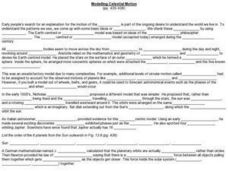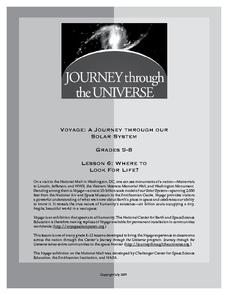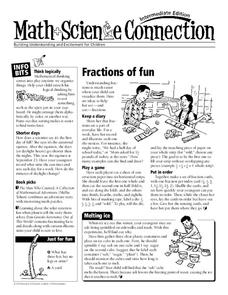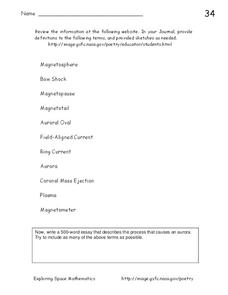Curated OER
A Model Solar System
If Earth is modeled by a grapefruit, what planet could be represented by a golf ball? This activity uses everyday and not-so-everyday objects to create a model of the Solar System.
Curated OER
Formation of The Solar System
In this science worksheet, learners use basic scientific concepts to complete the series of puzzles that are intended to increase science literacy about the parts and formation of the solar system.
Laboratory for Atmospheric and Space Physics
Planetary Distances on the Playground
There's no need to stay inside; get out of the classroom and create a scaled map of the solar system on your playground field! In collaborative groups, scholars identify the distance between the sun and other planets, place planet...
Curated OER
Asteroids Between Mars and the Sun
In this asteroids of the solar system worksheet, learners observe a diagram showing all the minor planets found in the orbit of Mars. Students answer 4 questions about the minor planets inside the orbit of other planets, they find the...
Curated OER
Astronomy in the Round
In this round astronomical bodies worksheet, students use 6 photographs of various solar system bodies to answer 5 questions related to the roundness of these bodies. They create a number to represent the roundness of an object and they...
Lake Afton Public Observatory
Shadows, Angles, and the Seasons
Shine some light on the topic of seasonal change with this collection of activities. Whether it's by measuring the change in the length of their shadows, or modeling the earth's orbit around the sun using a lamp and a globe, these simple...
Curated OER
Earth Moon Scaling
A wonderful lesson incorporating math and physics skills along with specific details about the planetary bodies. The cross-curricular approach makes for a valid activity to challenge multiple ages and abilities. Your class could work in...
Teach Engineering
Ice, Ice, PV!
Knowing the temperature coefficient allows for the calculation of voltage output at any temperature. Groups conduct an experiment to determine the effects of temperature on the power output of a solar panel. The teams alter the...
Laboratory for Atmospheric and Space Physics
Growing Up With A Mission
New Horizons began its journey to Pluto in 2006. Ten years later, it continues its mission. In that time, scholars have surely grown, but how much more will they grow by the time New Horizons reaches its destination? Find out with an...
Laboratory for Atmospheric and Space Physics
Where Are We Going?
Come take a ride on the space bus! Scholars go on an imaginary trip to pick up their peers from the inner and outer planets while reinforcing math skills. First, learners round decimals to identify each planets' distance from Earth....
Laboratory for Atmospheric and Space Physics
The Planets and Scale
Scholars gain an insight into the relative size of planets and distance between inner and outer planets with the help of informational text, a data table, and a series of four questions.
Laboratory for Atmospheric and Space Physics
Charting the Progress of New Horizons
In 2006, New Horizons began its mission to fly to Pluto. As it continues its journey, scholars track its progress with the help of an informative website, all the while reinforcing measurement concepts with the construction of a scaled...
Curated OER
Modeling Celestial Motion
In this modeling celestial motion instructional activity, students fill in the blank about the motion of celestial bodies: planets and stars. Students complete the blanks with information about the scientists and philosophers responsible...
Curated OER
Is There a Tenth Planet?
For this planets worksheet, students read about how our solar system's planets were discovered and how scientist believe there might be a tenth planet. After reading, students complete 4 short answer questions.
Messenger Education
Give Me a Boost—How Gravity Assists Aid Space Exploration
The propellant needed for space explorations runs in the thousands, while paying to get the craft into orbit costs millions! In the second installment of three, two activities explore laws of conservation of energy and momentum. Using...
Curated OER
Satellites and Solar Cells
In this satellite and solar cells worksheet, students determine the electrical power generated by the solar cells on the IMAGE satellite. Students solve 3 problems including finding the usable area of the satellite, determining the power...
Curated OER
Magnetic Energy
In this magnetic energy worksheet, students are given the formula to calculate the magnetic energy of an object. They use the formula to solve for the magnetic energy of the Earth, a geotail, the Sun, and a solar prominence given their...
Journey Through the Universe
Where to Look For Life?
Every year we discover new planets including more than 1,000 in 2016 alone. Will we ever find life on another planet? The lesson includes two activities to help scholars understand this concept. First, they analyze the temperature range...
Journey Through the Universe
How Far is Far?
The earth only revolves around one thing — and it's not any of your pupils. The lesson includes two activities dealing with the distance to the sun and the moon. First, scholars create a pin hole camera and use the rules of similar...
Resources for Educators
Fractions of Fun
Reinforce concepts and encourage learner engagement with a collection of math games, science experiments, and cross curricular activities. In one fun resource, learners sort objects, keep a diary of everyday fractions, play a game using...
Curated OER
Worksheet 28 - Spring 1996
In this math instructional activity, students examine the graph in polar coordinates of r = f(θ). Then they sketch a graph of the modified functions indicated.
Curated OER
Water on Planetary Surfaces
In this water on planetary surfaces worksheet, students read about the Galileo spacecraft and the surface of Jupiter's moon Europa. They read about the energy needed to keep the water in a liquid state on Europa. Students solve 4...
NASA
Auroras
In this auroras learning exercise, students define 11 terms related to space phenomena such as auroras, coronal mass ejections and auroral ovals. Students use a given website to help them define the terms and they write a 500 word essay...
























